Slick new documentary puts Northern Bank robbery back in focus
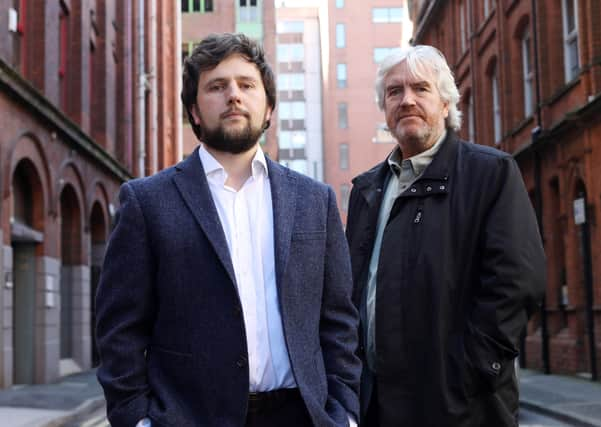

News Letter’s political editor Sam McBride has made his first foray into the world of TV documentaries with the help of veteran investigative journalist Darragh MacIntyre.
Their subject matter is the well-documented Northern Bank robbery, however the pair manage to cast fresh light on the heist, presenting it in the context of major events including the murder of Robert McCartney, IRA decommissioning, the suspension of the NI Assembly and the subsequent powersharing between the DUP and Sinn Fein.
Advertisement
Hide AdAdvertisement
Hide AdHeist: The Northern Bank Robbery, will be broadcast tonight at 9pm on BBC One NI.
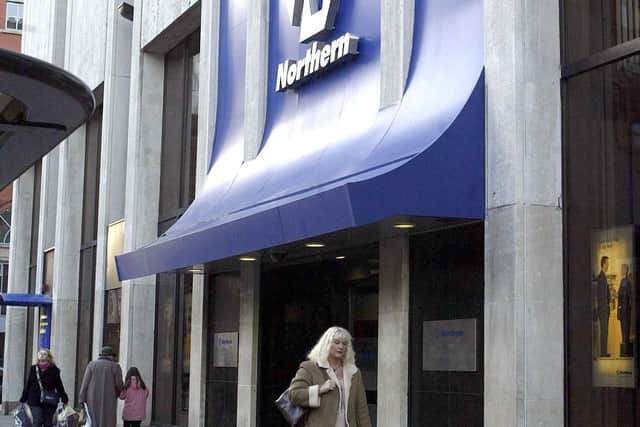

While Sam and Darragh front the documentary, it’s a team effort.
Director Raphaelle O’Loan said: “This film was very much based on the back-breaking work of Chris Moore, who is the producer and a brilliant investigative journalist. He has written a book about it and he did a documentary around the time whenever he was in UTV. He had done a huge amount of work on the project before I ever came on board.”
The BBC’s journalism hub paved the way before Sam and Darragh entered the fray.
Advertisement
Hide AdAdvertisement
Hide AdRaphaelle said: “What they would have provided before anything was filmed with Sam and Darragh is all the theories that are expounded – here’s what happened, here’s what could have happened, here’s some new evidence, new documentation.
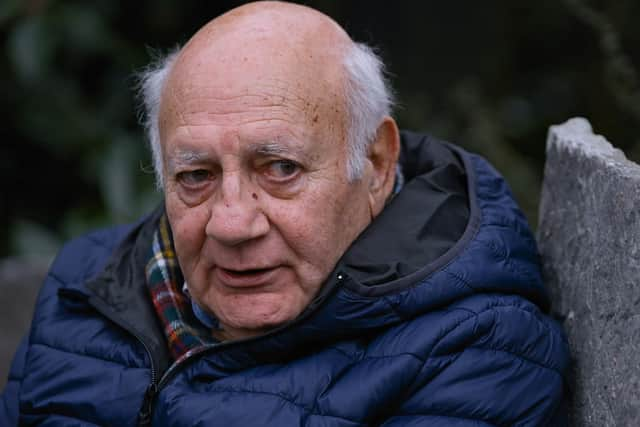

“They were given that to run with and then do their journalistic analysis, honing in on what the evidence was telling them and how they could move it forward, come to some conclusions.”
Sam said: “Unlike my natural habitat of print journalism, there’s an awful lot beneath the waterline in this iceberg that you don’t see. Very large sections of those interviews aren’t broadcast, but have informed our journalism. There’s people we spoke to who aren’t in the programme, sources who came forward, people who have knowledge of this. All of that is reflected in some way in our discussion, but it’s not all visible.”
The Northern Bank robbery was the biggest heist in British history just days before Christmas, in December 2004. In a sophisticated operation, the gang took two families hostage for 24 hours, forcing two bank employees to rob £26.5m from the cash centre.
Advertisement
Hide AdAdvertisement
Hide AdFollowing the Northern Bank robbery, suspicion immediately fell on the IRA and a political storm ensued which threatened to derail a fragile peace process. Sixteen years on, despite an international police investigation, it remains unsolved.
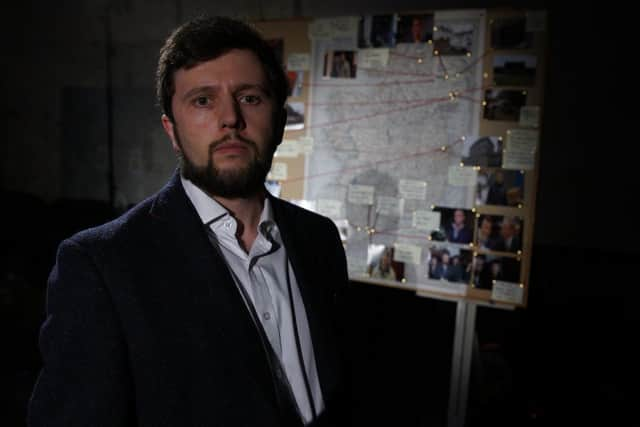

The HQ for the BBC investigation shedding new light on the robbery was the derelict premises of an Asian supermarket on the Ormeau Road.
“It was constructed like a small drama set,” said Maria McKeagney, the show’s executive producer.
It sets the tone for the film, moving away from the more formal style of relaying information, instead aiming to take a peak behind the curtain of investigative journalism.
Advertisement
Hide AdAdvertisement
Hide AdRaphaelle said: “The basis for the pitch was a modern style of film making we’ve honed in on – the idea that Sam and Darragh would be exposing their journalism.
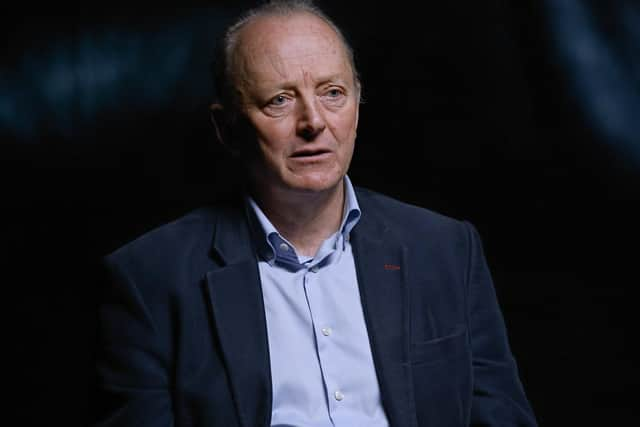

“I think audiences are attracted to that, they find it a really easy way to assimilate a lot of information that you wouldn’t necessarily get from a more formal, traditional documentary. Because the two guys are great communicators it worked really well.”
Darragh commented: “The audience immediately know when something is acted, they’ll know instinctively whether stuff is real. Whether it’s good, bad or indifferent is another thing.”
Heist includes some material never before viewed on television including 999 calls, court testimony and CCTV footage from inside the vault during the robbery.
Advertisement
Hide AdAdvertisement
Hide AdDarragh said: “Those 999 calls – you’re brought right back to the moment with that material. It’s incredibly engaging and arresting.
“You’ve also got the footage from inside the vault where the two bank employees are under huge pressure yet seem to be going about their job with a serene professionalism.”
Mary commented: “The court testimony from Kyran McMullan (the wife of bank employee Kevin McMullan who was kidnapped and taken to a remote forest) was really harrowing. We take time to reflect it wasn’t a caper, there was serious fall out from this.”
Raphaelle commented: “It’s a story that everyone thinks they know, but seeing it in the overarching political context and tying up a lot of loose ends, even people who think they know the story will garner some new information from it.”
Advertisement
Hide AdAdvertisement
Hide AdCredit for fitting the huge amount of material into an hour-long documentary goes to Cathy Whitla.
Mary commented: “She an incisive, sensitive editor – a brilliant story teller.”
Interviews with key players
The show contains several high profile interviews with key figures like former Taoiseach Bertie Ahern, ex-PSNI chief con Sir Hugh Orde and former first minister Peter Robinson as well as one of the men convicted in relation to the robbery.
Darragh said: “Ted Cunningham is one of the few people who have been convicted in relation to handling the proceeds of the Northern Bank robbery. One of the kickers is that having pleaded guilty a few years ago, he is now appealed that conviction. It’s an interesting little twist.”
Advertisement
Hide AdAdvertisement
Hide AdAsked if they had been turned down for some interviews, Sam said: “There were several people we couldn’t get, most of them were from Sinn Fein – the leadership, maybe someone who was senior in the party at that point. It wasn’t for want of trying but for unsurprising political reasons they decided they didn’t want to do that.
“The PSNI were someone we wanted to speak to – is there a current investigation, what’s going on, is there any hope of it ever being solved? We couldn’t get to ask those questions. They weren’t keen to be interviewed.”
Did Gerry Adams and Martin McGuinness consent to robbery?
Much of the fascination around the Northern Bank robbery stems from the fact it has never been solved.
Sam is unsure that it ever will be solved.
He said: “We asked lots of people if they think it will ever be solved. There were various answers with different emphasis in them, but most people said ‘no’.
Advertisement
Hide AdAdvertisement
Hide Ad“Some said conspiratorially that it would be too damaging to the peace process at this point to solve it.”
He said: “One of the reasons why police keep making appeals 20, 30 years after a crime is that sometimes people crack and they say, ‘you know what, I’m going to tell my part of the story’.
“I don’t think it’s impossible that that happens but it’s increasingly unlikely.”
Sam didn’t enter journalism until a year after the Northern Bank robbery which meant, he says, that he had no preconceptions: “What really struck me and still strikes me is the speed at which we move from the biggest crisis in the peace process, the Northern Bank robbery, then Robert McCartney’s murder soon after that, to accelerating the pace of IRA decommissioning.
Advertisement
Hide AdAdvertisement
Hide Ad“One of the things we were trying to get to was, could anybody have foreseen that, or are we retrospectively projecting onto the past what we know happened and thinking that therefore there was some grand plan.”
Discussing some of the theories Darragh said: “There’s the IRA demonstrating, without the loss of life, that they are still very powerful – a message to the government and also to their own people.
“There’s the IRA pension fund idea or maybe that the money was going to be used for Sinn Fein’s political ambitions, or maybe that the money was set aside to buy arms should conflict be renewed.”
He said: “One key question for me was the degree of knowledge the political leadership of the republican movement had at the time. That to me seemed to be very important.
Advertisement
Hide AdAdvertisement
Hide Ad“We are working on the basis that if the IRA did carry out this robbery, did they do that with the consent of people like Gerry Adams and Martin McGuinness? That’s something we examine.
“It’s very satisfying to see everything in context, when you intercut the crime with the events that were unfolding like in Washington around the murder of Robert McCartney. You get an overall picture in a very succinct amount of time.”
Praise for Sam after documentary bow
Sam has become a familiar face on our televisions thanks to his expert analysis of NI politics, though Heist marked a new direction in his journalistic career.
He said: “This is the first time I’ve presented or reported for TV like this. It was wholly new to me. It was made a lot easier by the nature of the programme. It wasn’t formal – standing, giving a piece to camera.
Advertisement
Hide AdAdvertisement
Hide Ad“It was much more natural. It was about Darragh and me talking to each other, unscripted, looking through the evidence we’d found, that the team had found – assessing it, questioning it. What you see in the film is really very genuine.”
Sam commented: “With me coming in as a print journalist, not being familiar with how television is made, Raph and Darragh really put me at ease and took me through the whole thing.
“Ultimately it was sitting talking about the journalism behind it. If it had been scripted I might have found it a bit more unnatural.”
Executive producer Mary McKeagney was very impressed: “There was a great chemistry between the two of them, I think that’s apparent from the documentary. Raphaelle really drew that out brilliantly.
Advertisement
Hide AdAdvertisement
Hide Ad“Sam was thrown into this environment that was quite foreign, people’s first TV experience is usually can you lean against that wall and say this piece to camera which they have to do 20 times. This really was a baptism of fire, it was sink or swim and he really swam. He’s a natural.
Fellow journalist Darragh MacIntyre said: “I was in complete awe of him from the minute we started working together. It was extraordinary the way he took to it.
“He’s unflappable and always completely coherent and has something interesting to say. He has so much poise on television, I shouldn’t have been surprised really when I see him involved in commentary and political affairs day and daily and he’s hugely impressive, such a wonderful writer as well. His telling of the RHI story reads like a thriller.
“Should he choose to have a future in TV I’ve no doubt people will be scrambling to hire him.”
_______
_______
A message from the Editor:
Advertisement
Hide AdAdvertisement
Hide AdThank you for reading this story on our website. While I have your attention, I also have an important request to make of you.
With the coronavirus lockdown having a major impact on many of our advertisers - and consequently the revenue we receive - we are more reliant than ever on you taking out a digital subscription.
Subscribe to newsletter.co.uk and enjoy unlimited access to the best Northern Ireland and UK news and information online and on our app. With a digital subscription, you can read more than 5 articles, see fewer ads, enjoy faster load times, and get access to exclusive newsletters and content. Visit https://www.newsletter.co.uk/subscriptions now to sign up.
Our journalism costs money and we rely on advertising, print and digital revenues to help to support them. By supporting us, we are able to support you in providing trusted, fact-checked content for this website.
Alistair Bushe
Editor